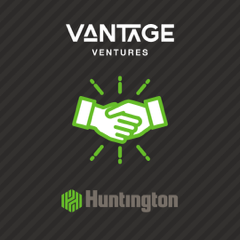Huntington Bank and Vantage Ventures Launch West Virginia Start-Up Fund to Foster More Growth in West Virginia’s Entrepreneur Economy

Vantage Ventures provides startups resources to build and scale their companies. In proud cooperation with Huntington Bank, a top 20 largest bank in the United States with over $183 billion in assets, Vantage Ventures is now better able to support present and future startups in West Virginia. Both organizations are striving to build a more inclusive and sustainable financial services industry and enable driven entrepreneurs in underserved areas like West Virginia access to the customers, talent, and capital they need to build their companies. The launch of the West Virginia Start-up Fund will expand Founders of investable companies’ financing options and diversify the state’s economy.
In January, Vantage Venture’s social media and marketing teammate, Trevor Swiger, interviewed Chad Prather, President of West Virginia at Huntington National Bank, to gain further insight into the bank’s efforts to strengthen the growing West Virginia entrepreneurial community. Read below to learn more about the vision and leadership at a critical time.
1. With Huntington Bank’s leadership in the regional bank sector and as one of the largest banks by deposits in the United States, can you explain some of the things the bank is doing to create a more inclusive and sustainable financial services industry?
Although we are a large financial institution with a lot of sophistication and capabilities, we have never wavered from our commitment to, and involvement in, our local communities.
Every community is different, and so are its needs. Our colleagues across the region are engaged and active locally. Through this engagement, we get a sense of the gaps, needs, and opportunities in the communities where we live and work. We try to fill those gaps and address those needs. Our Huntington colleagues are truly instrumental across our footprint in helping us to make this happen.
So, while we are one of the top 20 largest financial institutions in the country, we’re also deeply embedded locally, giving us the feel of a community bank. Being a large financial institution, our customers benefit from the best practices happening not only here but across all of Huntington.
The West Virginia Start-Up Fund is certainly a great example of how we’re helping to make financial services more accessible. We’ll be able to help new business owners who would otherwise not receive financing.
Another example of how we’re increasing accessibility to financial services is our Lift Local business program. The small-business lending program focuses on serving minority, women and veteran-owned businesses with Small Business Administration (SBA) guaranteed loans from $1,000 to $150,000.
2. Huntington Bank is one of the top 20 largest banks in the United States and has ample opportunity to support businesses that operate on a much larger scale with debt funding. Why do you feel the emerging growth companies based in West Virginia are an excellent place to start?
We’ve all chosen to live here for a reason – and that’s generally because we love the people and the place. But our mountains, although we love them, make it difficult for businesses that require a large, flat area to move here.
Although we have great communities, we also don’t have the population density to fulfill the workforce needs of some larger companies. With that being said, there’s no reason why we can’t be one of, if not the best place, to start a business. We have all the resources to help companies get started. One of the biggest challenges new businesses face is access to capital, and that’s an area where Huntington can step in and provide assistance.
3. West Virginians are known for their resilience as much as their pragmatic approach to solving problems. Are there certain industries or challenges that companies are addressing that Huntington Bank is particularly interested in supporting?
We are focusing more on economic development in general. We partner with like-minded organizations that have strategic economic development as a priority. This includes local economic development organizations, regional initiatives in various parts of the state, along with our state development office.
4. What type of businesses would be prime candidates for working with Huntington Bank and Vantage Ventures in the debt fund?
It’s companies that are new or relatively new – that may not yet qualify for a traditional business loan but have the fundamentals necessary to be able to take on debt financing.
5. Considering that startups in West Virginia are all in different places on their entrepreneurial journeys, how do you see loan sizing being determined?
No two companies are the same. Working capital and expenditures are different for all businesses. We will look at each company individually to determine the loan size.
6. We often see startup Founders with stronger technical or scientific skills than business knowledge. What support or tools does Huntington Bank provide entrepreneurs to fill this gap?
We offer cash management and treasury management solutions. We also have contacts across the state for legal, accounting, small business coaching, etcetera, to help connect these founders with people who can help them to succeed.
We’ve banked so many small businesses, we can help entrepreneurs make mentorship connections. Our partnership with Vantage Ventures and similar organizations across the state also helps to provide business owners with assistance.
7. Is there anything else you want the Vantage Ventures community and supporters to know?
There are a lot of excellent competitors – big, small, and everything in between. What makes us different is that we’re a top-20 bank, one of the most sophisticated in the country, yet we’re embedded in the communities here in West Virginia. This local connectivity and our capabilities allow us to deliver the kind of service you’d expect from a neighborhood bank coupled with all of the options and opportunities offered by the nation’s largest banks.
